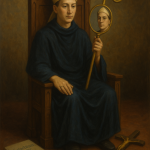In the narrative itself, Bronte warned against misreading Heathcliff. Isabella, his wife, stands in for the bad reader–a brilliant, ironic political point in itself. The bad reader is the sentimental reader of romance novels when life, love, and art demand a confrontation with the politics of power. The bad reader romanticizes the sadist and reads the rapist, the abuser, the violent man, as a romantic hero: tortured himself, despite proof that he is the torturer. Heathcliff describes this bad reader when he describes Isabella:
“She abandoned [her family and friends] under a delusion … picturing in me a hero of romance, and expecting unlimited indulgences from my chivalrous devotion. I can hardly regard her in the light of a rational creature, so obstinately has she persisted in forming a fabulous notion of my character and acting on the false impression she cherished.”
–Andrea Dworkin, “Wuthering Heights,” in Letters from a War Zone: Writings 1976-1989. Dworkin overwrites, always, but this essay is absolutely worth your time if you care about WH, as I do. Dworkin gets so much of its essence–even the parts with which I take issue (e.g. the eroticism of sameness)–and although she for the most part ignores WH‘s formal or perspectival innovations, she is 100% what she always is: hardcore. And WH demands a hardcore reader. WH demands a reader who can be at least as unflinchingly oneself as Andrea Dworkin was.











